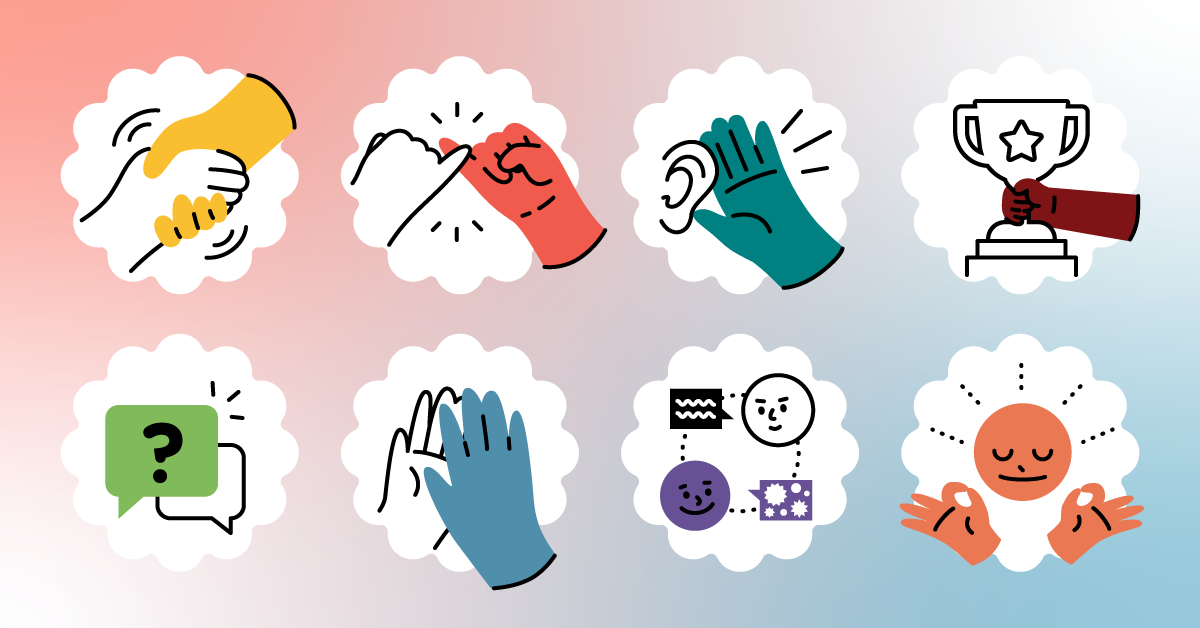
Everyone wants to make a good impression, but that can be easier said than done! How can you cement your reputation in the workplace? Here are 8 ways to start.
1. Go Out Of Your Way To Help Others
This might sound obvious, but the fastest way to gain trust is to help out the people around you. Your peers and professional network are going to be more open to making connections with someone who has helped them personally. If you can get a reputation as someone who helps others, you’re more likely to climb the ranks at your organization.
This doesn’t mean you need to put yourself at risk of burning out or compromising your values if you’re not particularly Altruistic— it just means that you should try to say yes as often as possible to help others out.
Ask for regular performance feedback and set a cadence of strong communication with your supervisor and your peers.
2. Follow Through On Promises
Anyone can make promises but it takes more thought to deliver— being known as someone with follow-through will boost your reputation and build up goodwill on your team.
Studies from Gallup found that 74% of employees worldwide believe corruption is widespread among businesses, and only 23% of U.S. employees strongly agree that they trust the leadership of their organization.
Trust is at a premium right now! Whether your role at work is that of an executive or an entry-level employee, you still need to put in the work and prove yourself to your team. Actions speak louder than words— make promises carefully and always follow through. If that’s not possible, make sure to communicate and develop a new timeline for task completion without prompting.
3. Practice Active Listening
One of the best things you can do to build trust and improve your relationships is to practice active listening in conversation. Active listening requires eye contact, open body language, and engagement in the conversation at hand.
Try to listen to understand—- while someone else is talking, you shouldn’t be planning a response. Take your time in conversation and answer thoughtfully, not just quickly. (If you want more active listening tips, we’ve got you covered!)
People generally enjoy talking about themselves— this is driven by the deeply human urge to be understood by others. Making genuine connections will reinforce your reputation as someone who cares about others.
4. Contribute To Company Culture
A positive organizational culture makes a huge difference in the experience of everyone who works within it. You can contribute to that positivity as an individual!
Take a look at your company values and assess— which ones do you agree with? Which ones do you want to expand on? How can they be expanded on? A deeper reflection will help you set your goals and understand your company’s foundational structure better.
The next step is to take action. Find the company values that you want to support and then find an action to take, as an individual or as a group. This can look like creating a volunteering program, pushing for more internal development, developing a mentorship program, asking for extra learning opportunities, or whatever else you’ve determined will fuel your internal Drivers.
This will help you shape your workplace to support your personal growth and development, open the door for opportunities for others, and show your peers that you are invested in making your organization a better place to work.
5. Ask Lots Of Questions

This is a more general tip, but making asking questions part of your conversation process. Getting clarity is the best way to avoid confusion and conflict— ask others what they need from you, cement due dates and deliverables, establish a more productive cadence in your meetings, and draw out your more shy team members with thoughtful questions.
Whether asking clarifying questions fits your natural behavioral style or goes against it, it will help cement your reputation as someone who is thoughtful and thorough. Make sure to consider the time and place when you get into it— you don’t want to waste time with rehashing known information! Mind this by restating what you understand to be true and then checking with your team.
6. Collaborate Across Departments
One of the problems in organizations is the fact that many teams fall into the trap of silos. This means that each team is operating independently without thinking about how their contributions affect the whole organization. Even worse, this often happens subconsciously, due to isolated groups and the ‘bubble’ of their own team.
This is where you come in! Collaborating across departments will only strengthen your respective teams and make work easier. You might have to make the first move here and offer your skillset up to another team, asking specifically how you can help them. This work up front is worth it for the long-term excellent impression you will be making as a go-getter. People will begin to identify you as someone to go to with ideas and new work, and you can make yourself and your role as ‘diplomat’ invaluable in your organization.
7. Ask For A Skip-Level Meeting
In the spirit of connecting across departments, start asking for skip level meetings. A skip level meeting is a way to speak with your boss’s boss, or your direct report’s direct report (depending on your level in your organization).
The purpose of a meeting like this to get the perspective of people you wouldn’t usually interact with. You will be able to learn more about their daily work, their aspirations on their team, and their needs. It can open the doors to the collaboration we just talked about and, if you’re not an executive, it will make you more visible to the leaders in your organization. Taking this initiative will cement your reputation as a go-getter.
8. Manage Stress Levels To Avoid Burnout
Stress often makes us the worst versions of ourselves— it negatively affects our perception of ourselves and others, our memories, and our mental, emotional, and physical health. It’s not something you can ignore!
The good news is that you can vastly improve your own understanding of yourself and your triggers by working on developing your emotional intelligence. Practicing mindfulness improving self-awareness and self regulation, and being careful about how you manage conflict will all contribute to less stress overall.
That being said, remember to kick your feet up sometimes! You truly cannot focus on your reputation if you’re burning out. Taking time to relax and rest is crucial for your long-term professional success and your health.
Are you interested in learning more about yourself through assessments? TTI SI can help!
Do you want to take an assessment or start using assessments for your team? Let us know here.
Are you interested in joining our network as a reseller? Get the info you need here.




